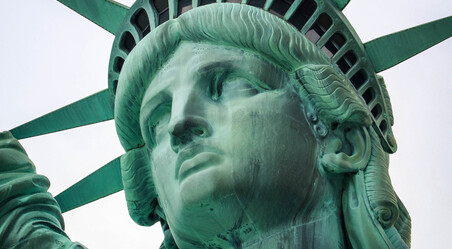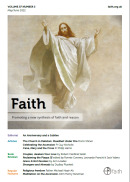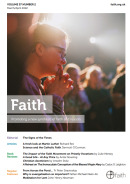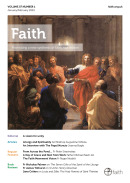Featured
On to 2022
The Church's Year begins in Advent. This is a season of fresh beginnings. Let’s look forward in hope.
Saint Joseph: Living affirmation of our human nature
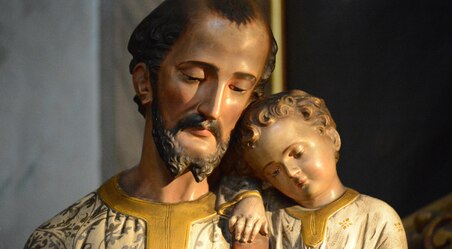
Timothy Finigan on the importance of St Joseph as this year dedicated to him reaches its conclusion.
Love for Love: The Religious Sister of the 21st Century
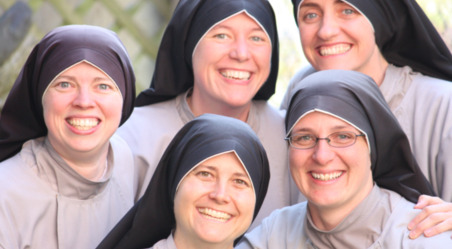
Sister Mary Diana Dreger, OP explores religious life for women today.
Should we be Assisting Patients to Die?

Father Michael Nazir-Ali looks at the dangers in the proposed legislation
The Faith Movement Vision

Fr Roger Nesbitt sets out the vision of the Faith Movement
Book Review: A People's Tragedy

A People’s Tragedy: Studies in Reformation by Eamonn Duffy
Bloomsbury Continuum 264pp
£18.00
Book Review: The Other Sun

The Other Sun: A Spiritual Autobiography
by Olivier Clément
Gracewing 224pp
£15.99
Book Review: In Search of the Sacred Image

In Search of the Sacred Image
by Aidan Nichols, OP
Gracewing 288pp
£15.99
-
On to 2022
The Church's Year begins in Advent. This is a season of fresh beginnings. Let’s look forward in hope.
Let’s not have any illusions about the next months. We do need an understanding that large numbers of people have been absent from church for a long time: for some children, it’s a significant portion of their lifetime. Our Bishops have announced that the obligation to return to Sunday Mass returns on the First Sunday of Advent: the dispensation from the obligation, introduced because of the Coronavirus, ceases on that date.
But we also need a vigorous, upbeat, affirmative message about the centrality of the Eucharist as the “source and summit” of our faith (cf. Lumen gentium, 11), and as the great reality at the core of our lives as Christians. A strong mention of the need to confess sins and received absolution should accompany this: with churches open, and confessionals functioning, we need an offer of a flooding tide of sacramental grace pouring out over thirsty souls. This in turn means instruction: clear teaching on how to go to confession, with an assumption that for many, many people this is largely unknown territory.
Our rights and obligations
We also need a clear affirmation of the right and obligation of Catholics to teach the Faith in the family, in church, and in Catholic schools. This need not be announced in any angry or polemical spirit, but it must be stated clearly as something positive and as contributing to the common good, confirming the human rights of families as stated in international charters.
And we need some events that will boost morale, public celebrations of our faith that will lift hearts and give witness. Looking ahead to 2022, these must be planned and organised. That hugely successful Eucharistic Congress in Liverpool in 2018 showed the way. And the best bit of it was in the pouring rain – that magnificent procession of the Eucharist through Liverpool, culminating in Benediction from the steps of the Cathedral. Everyone was soaked and frankly it was deeply satisfying: we all knew that this was something we had long needed and somehow it had a sort of cleansing message, and a sense of fresh beginnings. So let’s now get on with the next adventure.
When children returned to schools in Britain this past term, many had a sense of disconnection. Large numbers had not been involved with regular schooling for some months: a mix of online lessons, opportunities to return to school interrupted by random closures, and then the standard summer break, meant that the normality of belonging to a school community had been broken.
The sense of disconnection will be strengthened for those children who over the next weeks and months will be subject to further propaganda and hectoring, masquerading under the notion of being instructed in the correct “non-binary” way of thinking. Non-binary? That means not being allowed to understand the biological truth of the human race as male and female. Under cruel and absurd schemes imposed by lobby groups and funded by taxes, children and their parents are bullied and nagged into following an ideology they instinctively know to be wrong.
The law
Catholic schools ought to have a confident sense of exemption from this. The law specifically allows and encourages Church schools to teach the fullness of the Faith. This, of course, includes the Church’s understanding of the importance and significance of humanity as male and female. There is no – absolutely no – good reason for any Catholic school to adopt an ideology that contradicts the truth of the Christian teaching on the human person.
The sense of confusion and frustration in schools echoes that of the wider culture in Britain. Morale is low. Politicians are held in contempt. Christianity seems marginalised. There is much talk of “mental health issues”. Many people are, frankly, miserable. Parliament was confronted with a plan for allowing “assisted suicide” and the very phrase has a ghastly ring to it that seems to echo with the general mood.
Morale
Of course, boosting public morale is not what the Church was founded to do. But we do have some good news to offer. The Catholic Church must lift hearts with a programme that is focused on the Eucharist and speaks in uplifting and focused terms about the centrality of God and our dignity as men and women, made in His image and finding our true dignity and joy when we worship Him. We can and must do this. Our confused children, our ugly culture, our bleak sense of a loss of community and of purpose call for this with urgency. Let’s proclaim, teach and celebrate the truth of the Catholic Faith anew in 2022.



